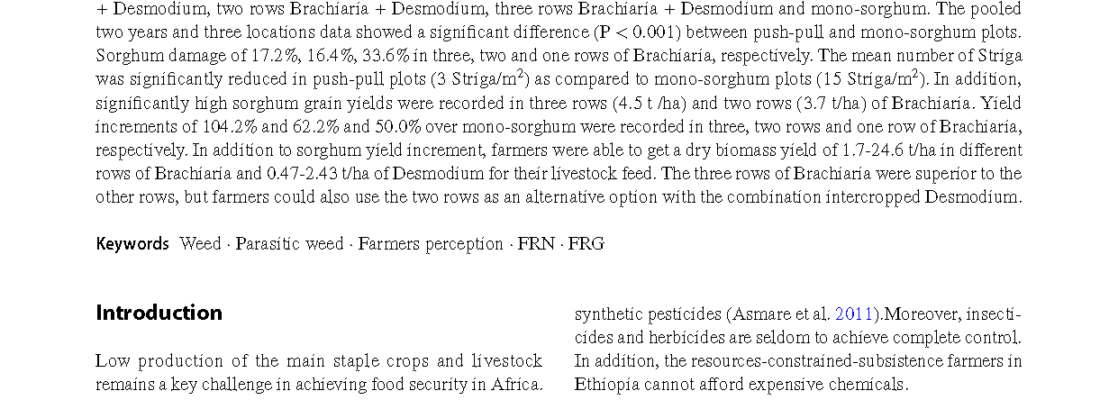By D Asmare · G Muluken · H Seid · A Tewodros · Y Rahmet
Accepted: 2 September 2021
International Journal of Tropical Insect Science
ABSTRACT
The lepidopteron stemborer (Chilo partellus) and parasitic Striga weed (Striga hermonthica) caused major yield losses in subsistence sorghum production in the Eastern Amhara Region, Ethiopia. This study evaluated different number of Brachiaria (Mulato II) rows planted around sorghum plots. Desmodium intortum intercropped with sorghum in each Brachiaria row. The study was conducted on 61 farmers’ fields in 2017 and 2018. The treatments were arranged as one row Brachiaria + Desmodium, two rows Brachiaria + Desmodium, three rows Brachiaria + Desmodium and mono-sorghum. The pooled two years and three locations data showed a significant difference (P < 0.001) between push-pull and mono-sorghum plots. Sorghum damage of 17.2%, 16.4%, 33.6% in three, two and one rows of Brachiaria, respectively. The mean number of Striga was significantly reduced in push-pull plots (3 Striga/m2) as compared to mono-sorghum plots (15 Striga/m2). In addition, significantly high sorghum grain yields were recorded in three rows (4.5 t /ha) and two rows (3.7 t/ha) of Brachiaria. Yield increments of 104.2% and 62.2% and 50.0% over mono-sorghum were recorded in three, two rows and one row of Brachiaria, respectively. In addition to sorghum yield increment, farmers were able to get a dry biomass yield of 1.7-24.6 t/ha in different rows of Brachiaria and 0.47-2.43 t/ha of Desmodium for their livestock feed. The three rows of Brachiaria were superior to the other rows, but farmers could also use the two rows as an alternative option with the combination intercropped Desmodium.
Keywords: Weed · Parasitic weed · Farmers perception · FRN · FRG
Available downloads
The effect of Brachiaria rows on stem borer damage on sorghum
in Eastern Amhara, Ethiopia


